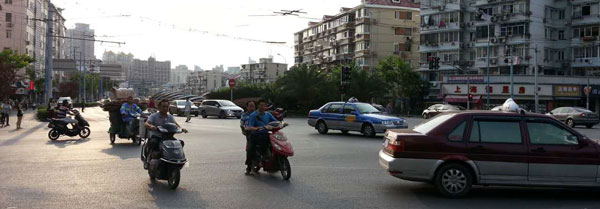Trying to understand Chinese culture in only two weeks is a tough task. Trying to understand Shanghai in two weeks is nearly impossible.

Shanghai is a city of contradictions that at times are both beautiful and jarring to the senses. The city has some of the finest modern architecture in the world; skyscrapers whose form seems to defy gravity and are surrounded by abundant greenspace. Looking at these buildings I feel like I am in one of the most cosmopolitan cities in the world.
The streets are busy with pedestrians in designer clothes, and the number of BMWs, Audis, and Ferraris would please the most status conscious American. Construction of new buildings is happening everywhere we go and much of the new construction is slated for luxury apartment homes.
And yet, amidst all of this luxury, status, and wealth you will see someone riding a bike loaded with goods twice as tall as the rickety bike with the rider, negotiating the traffic as if he belonged there. And he does belong there; but he doesn’t belong there, at least not to me.
My world view tells me that he belongs in a rural setting. Yet here he is in downtown Shanghai and no one thinks anything about it. Understanding Chinese (especially Shanghai) culture is more than understanding what is black and white; they use chopsticks and we use forks. To fully understand the culture you need to understand the sensory cues that tell us what we should expect in a given situation.
When we are given a cue and expectation does not meet reality the result can be discomforting, disorienting, intriguing, and wonderful all at the same time. Ferrari meets bicyclist, luxury condo meets shanty, fine dining meets street vendor, cultural pride meets Western marketing, progress meets censorship. This is Shanghai.
Our Fudan University classmates threw a party for us today. They gave us university t-shirts, provided Pizza Hut pizza, KFC, Coke, Sprite, and a lot of candy. We danced and played games for hours and I was sorry that it had to end. It has been such a pleasure to have class with the Chinese students and engage in discussions with them that we otherwise would not have the opportunity to have. There are things about America that they are curious about, and there are things about China that we are curious about.
As researchers, having discussions like this exposes our cultural biases and will hopefully lead to a better understanding of how these biases affect our research. I think that this may be the most important thing that I take away from this study abroad experience.



One Response